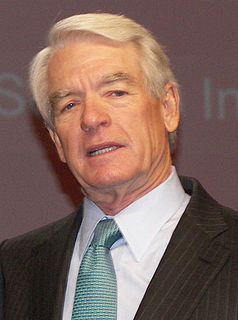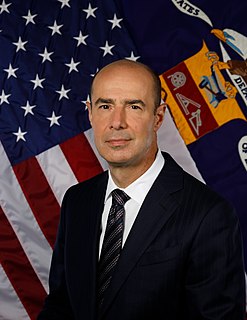Top 1066 Index Funds Quotes & Sayings
Explore popular Index Funds quotes.
Last updated on April 14, 2025.
Even fans of actively managed funds often concede that most other investors would be better off in index funds. But buoyed by abundant self-confidence, these folks aren't about to give up on actively managed funds themselves. A tad delusional? I think so. Picking the best-performing funds is 'like trying to predict the dice before you roll them down the craps table,' says an investment adviser in Boca Raton, FL. 'I can't do it. The public can't do it.'
The Adversity Index was created by msnbc.com and Moody's Analytics to track the economic fortunes of states and metro areas. Each month, the Adversity Index uses government data on employment, industrial production, housing starts and home prices to label each area as expanding, at risk of recession, in recession or recovering.
Invest in low-turnover, passively managed index funds... and stay away from profit-driven investment management organizations... The mutual fund industry is a colossal failure... resulting from its systematic exploitation of individual investors... as funds extract enormous sums from investors in exchange for providing a shocking disservice... Excessive management fees take their toll, and manager profits dominate fiduciary responsibility.
We need a federal government commission to study the way our financial services system is working - I believe it is working badly - and we also need more educated investors. There are good long term low-priced mutual funds - my favorite is a total stock market index fund - and bad short term highly priced mutual funds. If investors would get themselves educated, and invest in the former - taking their money out of the latter - we would see some automatic improvements in the system, and see them fairly quickly.
... skepticism about past returns is crucial. The truth is, much as you may wish you could know which funds will be hot, you can't - and neither can the legions of advisers and publications that claim they can. That's why building a portfolio around index funds isn't really settling for average. It's just refusing to believe in magic.
The rate of growth of the relevant population is much greater than the rate of growth in funds, though funds have gone up very nicely. But we have been producing students at a rapid rate; they're competing for funds and therefore they're more frustrated. I think there's a certain sense of weariness in the intellectual realm, it's not in any way peculiar to economics, it's a general proposition.
Index funds have regularly produced rates of return exceeding those of active managers by close to 2 percentage points. Active management as a whole cannot achieve gross returns exceeding the market as a while and therefore they must, on average, underperform the indexes by the amount of these expense and transaction costs disadvantages.
When I was 23, 24, I started covering hedge funds - a lot of this was luck - when no one else did. This was before hedge funds were the prettiest girl in school: this was pre-nose job and treadmill for hedge funds, when nobody talked to them - back then, it was just all about insurance companies and money managers.
Still, I figure we shouldn't' discourage fans of actively managed funds. With all their buying and selling, active investors ensure the market is reasonably efficient. That makes it possible for the rest of us to do the sensible thing, which is to index. Want to join me in this parasitic behavior? To build a well-diversified portfolio, you might stash 70 percent of your stock portfolio into a Wilshire 5000-index fund and the remaining 30 percent in an international-index fund.
Throughout the universe of public and private funds, managers are measured quarterly against one index or another, defined by statistics, and corralled into this category or that category so that fund of funds, pensions, and other institutions can make comforting - if not necessarily prudent - asset allocation decisions.
I was trying. I was crawling. I was coming into myself. I was trying to in some ways get beyond - what is the word that I'm looking for? - metaphorical language in painting, and to create something that was more indexical. And what I mean by that is that when you go to the library there's an index card that refers to a book that's actual and real in the world. So that index relates to something real.
While it is probably a poor idea to own actively managed funds in general, it is truly a terrible idea to own them in taxable accounts... taxes are a drag on performance of up to 4 percentage points each year... many index funds allow your capital gains to grow largely undisturbed until you sell... For the taxable investor, indexing means never having to say you're sorry.
Index funds are... tax friendly, allowing investors to defer the realization of capital gains or avoid them completely if the shares are later bequeathed. To the extent that the long-run uptrend in stock prices continues, switching from security to security involves realizing capital gains that are subject to tax. Taxes are a crucially important financial consideration because the earlier realization of capital gains will substantially reduce net returns.
Nothing highlights better the continuing gap between rhetoric and substance in British financial services than the failure of providers here to emulate Jack Bogle's index fund success in the United States. Every professional in the City knows that index funds should be core building blocks in any long-term investor's portfolio. Since 1976, the Vanguard index funds has produced a compound annual return of 12 percent, better than three-quarters of its peer group.













































